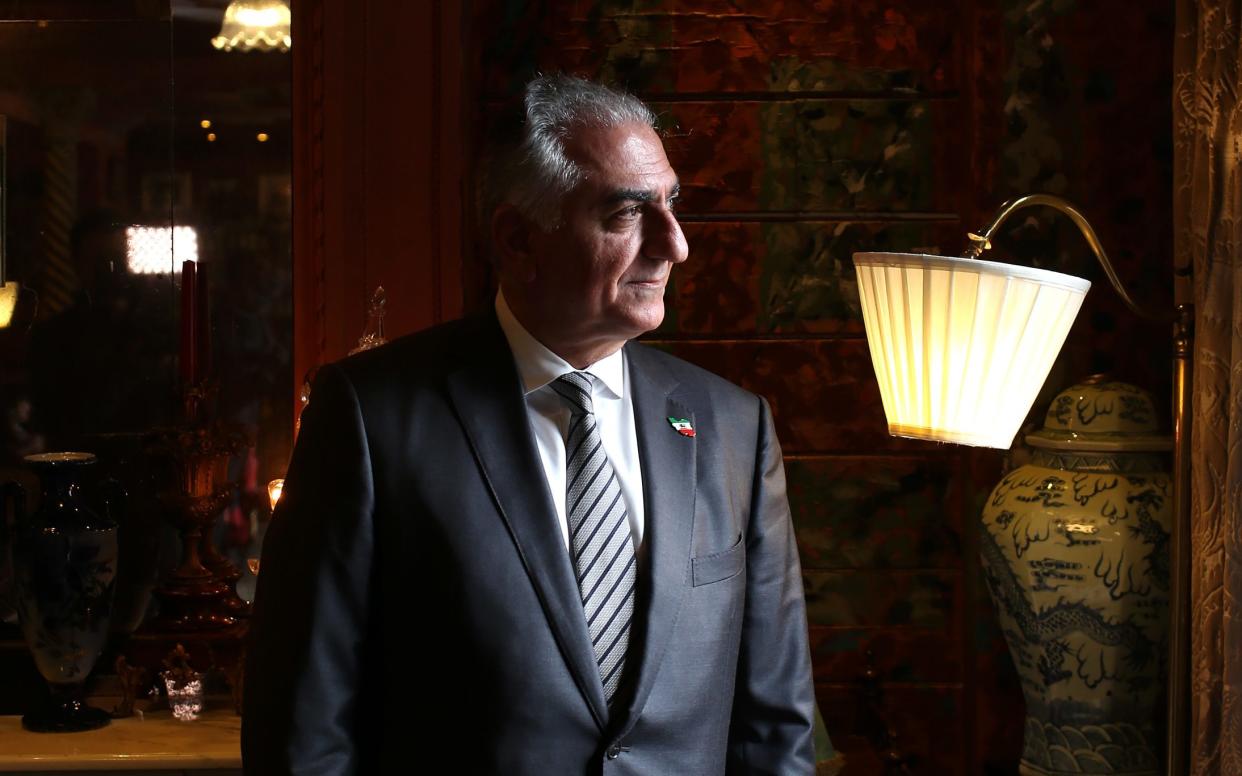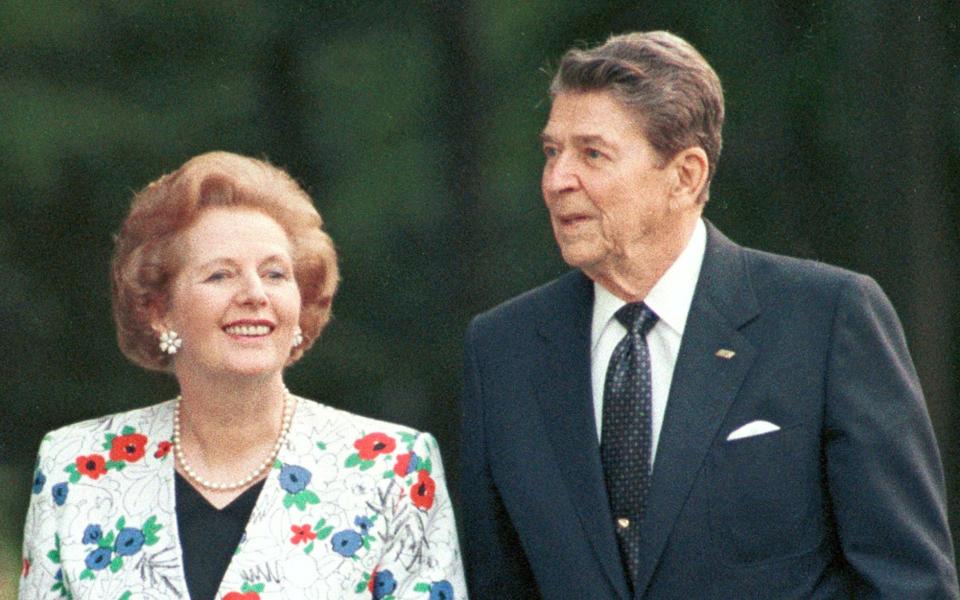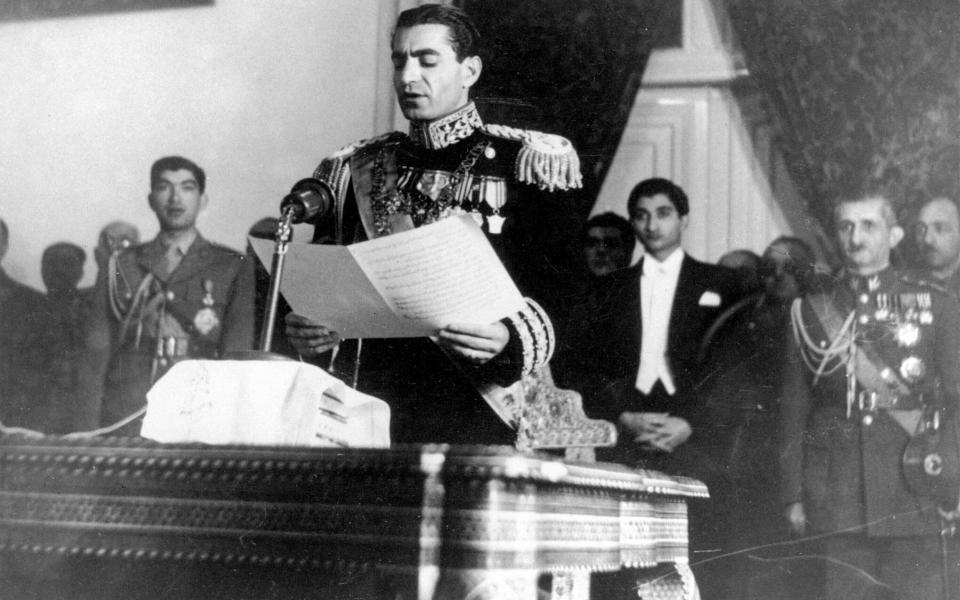Western appeasement of Iran has failed, says shah’s son

- Oops!Something went wrong.Please try again later.
- Oops!Something went wrong.Please try again later.
- Oops!Something went wrong.Please try again later.
- Oops!Something went wrong.Please try again later.
The West needs a Reagan-Thatcher style leadership pairing to confront Tehran because the current policy of appeasement has failed, Iran’s exiled crown prince told The Telegraph.
Reza Pahlavi, the eldest son of the last shah of Iran, is the founder and leader of the National Council of Iran, an exiled opposition group, and a prominent critic of Ayatollah Ali Khamenei’s Islamic regime.
He said there had been a “weak approach” by Western leaders “on both sides of the Atlantic” towards the Islamic Republic and called for a “reset” of Europe’s relationship with Tehran, starting with proscribing the Islamic Revolutionary Guard Corps (IRGC) as a terror organisation.
The prince, 63, also implicitly criticised Rishi Sunak for not doing enough to counter threats and intimidation of Iranian journalists based in London.
“The regime is trying to harm or threaten not only dissidents, but even British citizens,” he said, referring to the stabbing of Pouria Zeraati, the Iran International television host, outside his Wimbledon home last month.
What was being gained from not being “willing to respond in some form?” he asked.

He argued that the “root cause” of Iran’s malign influence across the Middle East – particularly its antagonistic role with regards to Israel – was the West’s policy of “appeasement”.
“That has always been based on expecting a behaviour change by the regime that hasn’t panned out,” he said, adding that what was needed was a revival of “an era where there was some stronger leadership that changed the world in a very significant way: Ronald Reagan and Margaret Thatcher at the end of the Cold War”.
“Right now you see what [Vladimir] Putin is doing in Moscow, you see what the Chinese are doing,” he added. “What is [being done] to counter that in terms of decisive, strong, co-ordinated leadership in the West? I don’t see any.”
The prince spoke to The Telegraph in an discreet apartment building in a smart corner of downtown Washington earlier this week, before Israel struck an Iranian air defence radar system near the city of Isfahan in retaliation for Tehran’s assault.
The US capital’s suburbs have been home to him, his wife and three daughters for decades, though he has previously referred to it as a “temporary place to live”, amid hopes he may one day return to his homeland.
The prince left Iran in 1977, aged 17, to undergo air force training in America. Two years later, his father Mohammad Reza Pahlavi was deposed during the Islamic Revolution and the royal family has been in exile ever since.
Following his father’s death in 1980, the prince declared himself the new shah of Iran in exile, although as Iran’s royal family was a constitutional monarchy, he was never formally appointed.
Dressed in a smart dark suit, with an expensive-looking watch adorning his wrist, the prince’s retinue refer to him as “his majesty”. So do his most devoted followers among the several-million-strong Iranian diaspora.
He has previously said he has no aspirations to restore the monarchy in Iran, but he remains an important figurehead for opposition figures and Iranians in exile.
It is a role he takes seriously, saying “we” as he discusses Iranians’ plight during the interview.
Over the past few decades, he made rallying opposition against Iran’s theocratic regime his life’s work, regularly travelling across Europe and America to campaign for a secular and democratic Iran and advocate for its oppressed citizens.
He became visibly frustrated when asked about ongoing diplomatic attempts with Tehran.
“There’s still some people in the Western world who think that they still have that dialogue within the status quo and are hoping ‘maybe we can revive this deal’ or ‘maybe we can cut this agreement’,” he said, leaning forward in his chair and using hand gestures to stress his point.
“This is basically kicking the can down the road,” he added. “Diplomacy has failed. Appeasement has failed. Any continuation of the same, frankly, is insanity.”
When asked which Western leaders he was thinking of, the prince did not want to single out individuals.
However, he did say that Tehran’s revenue had swelled in the last two years amid the Biden administration’s failure to enforce sanctions.
The exiled prince said the West needs to take the same approach with Tehran as it did with South Africa under apartheid.
“Finally the world said ‘you know what, this is no longer tolerable or acceptable’,” he said. “I think the scenario is similar in the case of Iran, except that while South Africa was having a racial policy, this is a terrorist-promoting regime. It’s not just a matter of being repressive. It’s actually a threat to the world.”
It is a point he has been making all week on US cable news following Iran’s unprecedented direct strike on Israel, which involved more than 300 drones, rockets and missiles.
After almost a half-century living in the shadow of exile, he is optimistic that the end is closer for Tehran’s rulers now than at any other point in the last 45 years.

“Regimes that are confident don’t start bashing their own people or killing children or doing what they’re doing,” he said, referring to the recent brutal repression of peaceful protests sparked by the 2022 death in custody of Mahsa Amini, a young woman detained for not wearing her hijab properly.
“That’s a sign of weakness and insecurity.”
Underscoring the dangers of his position, however, is the coterie of bodyguards and aides who sit nearby in the elegant living room-cum-study that looks out on to a terrace with a panoramic view of the Washington skyline.
It is Iran’s “Gen Z” that he believes offers the best hope for regime change. “These kids today, they follow Twitter, they follow Instagram or X or whatever other platforms, they’re not cut off from the world,” he said.
“They say: why shouldn’t I have the same opportunities that some young girl or boy has today in Doha or in Abu Dhabi or in Dubai?”
“They are trying to do their best but they’re denied every possible opportunity. That’s not tenable. And they talk about this, they voice their ideas, the fact of how united they are as a nation.
“Everything that this regime has tried to destroy in Iran is now coming as a retaliation to what has been done to them, manifesting itself in such a beautiful way,” he said.
With a smile, he added: “That’s what gives me hope, what gives me energy”.

